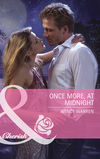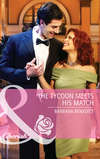Loe raamatut: «A Winter Proposal / His Diamond Bride»

Turn the page for a sneak peek at
Wealthy Australian, Secret Son,
the exhilarating new novel from international bestselling author Margaret Way available this month from all-new Mills & Boon® Cherish™.
CHAPTER ONE
The present
IT WAS an idyllic day for a garden party. The sky was a deep blue; sparkling sunshine flooded the Valley; a cooling breeze lowered the spring into summer heat. A veritable explosion of flowering trees and foaming blossom had turned the rich rural area into one breathtakingly beautiful garden that leapt at the eye and caught at the throat. It was so perfect a world the inhabitants of Silver Valley felt privileged to live in it.
Only Charlotte Prescott, a widow at twenty-six, with a seven-year-old child, stood in front of the bank of mirrors in her dressing room, staring blindly at her own reflection. The end of an era had finally arrived, but there was no joy in it for her, for her father, or for Christopher, her clever, thoughtful child. They were the dispossessed, and nothing in the world could soothe the pain of loss.
For the past month, since the invitations had begun to arrive, Silver Valley had been eagerly anticipating the Open Day: a get-to-know-you garden party to be held in the grounds of the grandest colonial mansion in the valley, Riverbend. Such a lovely name, Riverbend! A private house, its grandeur reflected the wealth and community standing of the man who had built it in the 1880s, Charles Randall Marsdon, a young man of means who had migrated from England to a country that didn’t have a splendid past, like his homeland, but in his opinion had a glowing future. He’d meant to be part of that future. He’d meant to get to the top!
There might have been a certain amount of bravado in that young man’s goal, but Charles Marsdon had turned out not only to be a visionary, but a hard-headed businessman who had moved to the highest echelons of colonial life with enviable speed.
Riverbend was a wonderfully romantic two-storey mansion, with a fine Georgian façade and soaring white columns, its classic architecture adapted to climatic needs with large-scale open-arched verandahs providing deep shading for the house. It had been in the Marsdon family—her family—for six generations, but sadly it would never pass to her adored son. For the simple reason that Riverbend was no longer theirs. The mansion, its surrounding vineyards and olive groves, badly neglected since the Tragedy, had been sold to a company called Vortex. Little was known about Vortex, except that it had met the stiff price her father had put on the estate. Not that he could have afforded to take a lofty attitude. Marsdon money had all but run out. But Vivian Marsdon was an immensely proud man who never for a moment underestimated his important position in the Valley. It was everything to him to keep face. In any event, the asking price, exorbitantly high, had been paid swiftly—and oddly enough without a single quibble.
Now, months later, the CEO of the company was finally coming to town. Naturally she and her father had been invited, although neither of them had met any Vortex representative. The sale had been handled to her father’s satisfaction by their family solicitors, Dunnett & Banfield. Part of the deal was that her father was to have tenure of the Lodge—originally an old coach house—during his lifetime, after which it would be returned to the estate. The coach house had been converted and greatly enlarged by her grandfather into a beautiful and comfortable guest house that had enjoyed a good deal of use in the old days, when her grandparents had entertained on a grand scale, and it was at the Lodge they were living now. Just the three of them: father, daughter, grandson.
Her former in-laws—Martyn’s parents and his sister Nicole—barely acknowledged them these days. The estrangement had become entrenched in the eighteen months since Martyn’s death. Her husband, three years older than she, had been killed when he’d lost control of his high-powered sports car on a notorious black spot in the Valley and smashed into a tree. A young woman had been with him. Mercifully she’d been thrown clear of the car, suffering only minor injuries. It had later transpired she had been Martyn’s mistress for close on six months. Of course Martyn hadn’t been getting what he’d needed at home. If Charlotte had been a loving wife the tragedy would never have happened. The second major tragedy in her lifetime. It seemed very much as if Charlotte Prescott was a jinx.
Poor old you! Charlotte spoke silently to her image. What a mess you’ve made of your life!
She really didn’t need anyone to tell her that. The irony was that her father had made just as much a mess of his own life—even before the Tragedy. The first tragedy. The only one that mattered to her parents. Her father had had little time for Martyn, yet he himself was a man without insight into his own limitations. Perhaps the defining one was unloading responsibility. Vivian Marsdon was constitutionally incapable of accepting the blame for anything. Anything that went wrong was always someone else’s fault, or due to some circumstance beyond his control. The start of the Marsdon freefall from grace had begun when her highly respected grandfather, Sir Richard Marsdon, had died. His only son and heir had not been able to pick up the reins. It was as simple as that. The theory of three. One man made the money, the next enlarged on it, the third lost it. No better cushion than piles of money. Not every generation produced an heir with the Midas touch, let alone the necessary drive to manage and significantly enlarge the family fortune.
Her father, born to wealth and prestige, lacked Sir Richard’s strong character as well as his formidable business brain. Marsdon money had begun to disappear early, like water down a drain. Failed pie-in-the-sky schemes had been approached with enthusiasm. Her father had turned a deaf ear to cautioning counsel from accountants and solicitors alike. He knew best. Sadly, his lack of judgement had put a discernible dent in the family fortunes. And that was even before the Tragedy that had blighted their family life.
With a sigh of regret, Charlotte picked up her lovely hat with its wide floppy brim, settling it on her head. She rarely wore her long hair loose these days, preferring to pull it back from her face and arrange it in various knots. In any case, the straw picture hat demanded she pull her hair back off her face. Her dress was Hermes silk, in chartreuse, strapless except for a wide silk band over one shoulder that flowed down the bodice and short skirt. The hat was a perfect colour match, adorned with organdie peonies in masterly deep pinks that complemented the unique shade of golden lime-green.
The outfit wasn’t new, but she had only worn it once, at Melbourne Cup day when Martyn was alive. Martyn had taken great pride in how she looked. She’d always had to look her best. In those days she had been every inch a fashionista, such had been their extravagant and, it had to be said, empty lifestyle. Martyn had been a man much like her father—an inheritor of wealth who could do what he liked, when he liked, if he so chose. Martyn had made his choice. He had always expected to marry her, right from childhood, bringing about the union of two long-established rural families. And once he’d had her—he had always been mad about her—he had set about making their lifestyle a whirl of pleasure up until his untimely death.
From time to time she had consoled herself with the thought that perhaps Martyn, as he matured, would cease taking up endless defensive positions against his highly effective father, Gordon, come to recognise his family responsibilities and then pursue them with some skill and determination.
Sadly, all her hopes—and Gordon Prescott’s—had been killed off one by one. And she’d had to face some hard facts herself. Hadn’t she been left with a legacy of guilt? She had never loved Martyn. Bonded to him from earliest childhood, she had always regarded him with great affection. But romantic love? Never! The heart wasn’t obedient to the expectations of others. She knew what romantic love was. She knew about passion—dangerous passion and its infinite temptations—but she hadn’t steered away from it in the interests of safety. She had totally succumbed.
All these years later her heart still pumped his name.
Rohan.
She heard her son’s voice clearly. He sounded anxious. “Mummy, are you ready? Grandpa wants to leave.”
A moment later, Christopher, a strikingly handsome little boy, dressed in a bright blue shirt with mother-of-pearl buttons and grey cargo pants, tore into the room.
“Come on, come on,” he urged, holding out his hand to her. “He’s stomping around the hall and going red in the face. That means his blood pressure is going up, doesn’t it?”
“Nothing for you to worry about, sweetheart,” Charlotte answered calmly. “Grandpa’s health is excellent. Stomping is a way to get our attention. Anyway, we’re not late,” she pointed out.
It had been after Martyn’s death, on her father’s urging, that she and Christopher had moved into the Lodge. Her father was sad and lonely, finding it hard getting over the big reversals in his life. She knew at some point she had to make a life for herself and her son. But where? She couldn’t escape the Valley. Christopher loved it here. It was his home. He loved his friends, his school, his beautiful environment and his bond with his grandfather. It made a move away from the Valley extremely difficult, and there were other crucial considerations for a single mother with a young child.
Martyn had left her little money. They had lived with his parents at their huge High Grove estate. They had wanted for nothing, all expenses paid, but Martyn’s father—knowing his son’s proclivities—had kept his son on a fairly tight leash. His widow, so all members of the Prescott family had come to believe, was undeserving.
“Grandpa runs to a timetable of his own,” Christopher was saying, shaking his golden-blond head. She too was blonde, with green eyes. Martyn had been fair as well, with greyish-blue eyes. Christopher’s eyes were as brilliant as blue-fire diamonds. “You look lovely in that dress, Mummy,” he added, full of love and pride in his beautiful mother. “Please don’t be sad today. I just wish I was seventeen instead of seven,” he lamented. “I’m just a kid. But I’ll grow up and become a great big success. You’ll have me to look after you.”
“My knight in shining armour!” She bent to give him a big hug, then took his outstretched hand, shaking it back and forth as if beginning a march. “Onward, Christian soldiers!”
“What’s that?” He looked up at her with interest.
“It’s an English hymn,” she explained. Her father wouldn’t have included hymns in the curriculum. Her father wasn’t big on hymns. Not since the Tragedy. “It means we have to go forth and do our best. Endure. It was a favourite hymn of Sir Winston Churchill. You know who he was?”
“Of course!” Christopher scoffed. “He was the great English World War II Prime Minister. The country gave him a huge amount of money for his services to the nation, then they took most of it back in tax. Grandpa told me.”
Charlotte laughed. Very well read himself, her father had taken it upon himself to “educate” Christopher. Christopher had attended the best school in the Valley for a few years now, but her father took his grandson’s education much further, taking pride and delight it setting streams of general, historical and geographical questions for which Christopher had to find the answers. Christopher was already computer literate but her father wasn’t—something that infuriated him—and insisted he find the answers in the books in the well-stocked library. Christopher never cheated. He always came up trumps. Christopher was a very clever little boy.
Like his father.
The garden party was well underway by the time they finished their stroll along the curving driveway. Riverbend had never looked more beautiful, Charlotte thought, pierced by the same sense of loss she knew her father was experiencing—though one would never have known it from his confident Lord of the Manor bearing. Her father was a handsome man, but alas not a lot of people in the Valley liked him. The mansion, since they had moved, had undergone very necessary repairs. These days it was superbly maintained, and staffed by a housekeeper, her husband—a sort of major-domo—and several ground staff to bring the once-famous gardens back to their best. A good-looking young woman came out from Sydney from time to time, to check on what was being done. Charlotte had met her once, purely by accident.
© Margaret Way, PTY., LTD 2011
About the Author
LUCY GORDON cut her writing teeth on magazine journalism, interviewing many of the world’s most interesting men, including Warren Beatty, charlton Heston and Sir Roger Moore. She also camped out with lions in Africa, and had many other unusual experiences which have often provided the background for her books. Several years ago, while staying Venice, she met a Venetian who proposed in two days. They have been married ever since. Naturally this has affected her writing, where romantic Italian men tend to feature strongly. Two of her books have won the Romance Writers of America RITA® award.
You can visit her website at www.lucy-gordon.com
Dear Reader,
I must admit to getting a wistful satisfaction from writing about a heroine whose beauty and allure knock men sideways. No hopeless sighing for her. One quirk of her gorgeous mouth, a look from her sultry eyes, and they fall at her feet, begging for her attention. I guess we’ve all indulged that fantasy at some time.
But the underlying truth is never so simple, as I learned from Pippa, heroine of A Winter Proposal. Beneath the surface of the sultry siren is a woman who has been hurt almost beyond bearing, and who has sheltered behind her desirability and her reputation as a good-time girl, determined not to let the world discover her fears.
Those fears include Christmas and mistletoe—both of which bring back suffering she can’t bear to recall.
But then she meets Roscoe, a man as damaged as herself, and as skilled at hiding it. Each of them sees through the other’s defences to the loving hearts beneath. Harsh and forbidding on the surface, Roscoe discovers depths of tenderness within himself, and uses them to rescue Pippa. Through him she finds that Christmas can once more be a time of joy.
But they are not alone in their struggle. Pippa’s beloved grandmother, Dee, has always been a loving presence, offering advice, and standing as a symbol of love’s triumph to inspire her to her own happy ending.
Warmest wishes,
Lucy Gordon
A WINTER PROPOSAL HIS DIAMOND BRIDE
LUCY GORDON

MILLS & BOON
Before you start reading, why not sign up?
Thank you for downloading this Mills & Boon book. If you want to hear about exclusive discounts, special offers and competitions, sign up to our email newsletter today!
Or simply visit
Mills & Boon emails are completely free to receive and you can unsubscribe at any time via the link in any email we send you.
A WINTER PROPOSAL
LUCY GORDON
CHAPTER ONE
AFTER five years the gravestone was still as clean and well-tended as on the first day, a tribute to somebody’s loving care. At the top it read:
MARK ANDREW SELLON,
9th April 1915—7th October 2003 A much loved husband and father
A space had been left below, filled three weeks later by the words:
DEIRDRE SELLON,
18th February 1921—28th October 2003
Beloved wife of the above
Together always
‘I remember how you insisted on leaving that space,’ Pippa murmured as she tidied away a few weeds. ‘Even then you were planning for the day you’d lie beside him. And the pictures too. You had them all ready for your own time.’
A family friend had returned from a trip to Italy and mentioned how Italian gravestones usually contained a picture of the deceased. ‘It really makes a difference to know what people looked like,’ she’d enthused. ‘I’m going to select my picture now.’
‘So am I,’ Dee had said instantly.
And she had, one for herself and one for her husband, taken when they were still in robust middle age. There, framed by the stone, was Dee, cheerful and ready to cope with anything life threw at her, and there was Mark, still bearing traces of the stunning good looks of his youth, when he’d been a daredevil pilot in the war.
Below them was a third photograph, taken at their sixtieth wedding anniversary party. It showed them standing close together, arms entwined, heads slightly leaning against each other, the very picture of two people who were one at heart.
Less than two months later, he had died. Dee had cherished the photograph, and when, three weeks after that, she had been laid beside him Pippa had insisted on adding it to the headstone.
Finishing with the weeds, she took out the flowers she’d brought with her and laid them carefully at the foot of the stone, murmuring, ‘There, just how you like them.’
She rose and moved back, checking that everything looked right, and stood for a moment in the rich glow of the setting sun. A passer-by, happening to glance at her, would have stopped and gazed in wonder.
She was petite, with a slender, elegant figure and an air of confidence that depended on more than mere looks. Nature had given her beauty but also another quality, less easy to define. Her mother called her a saucy little so-and-so. Her father said, ‘Watch it, lass. It’s dangerous to drive fellers too far.’
Men were divided in expressing their opinion. The more refined simply sighed. The less refined murmured, ‘Wow!’ The completely unrefined wavered between, ‘Get a load of that! ‘ and ‘Phwoar! ‘ Pippa shrugged, smiled and went on her way, happy with any of them.
Superficially, her attractions were easy to explain. The perfect face and body, the curled, honey-coloured hair, clearly luscious and extravagant, even now while it was pinned back in an unconvincing attempt at severity. But there was something else which no one had ever managed to describe: a knowing, amused look in her eyes; not exactly come-hither, but the teasing hint that come-hither might be lurking around the corner. Something.
A wooden seat had been placed conveniently nearby and Pippa settled onto it with the air of having come to stay.
‘What a day I’ve had!’ she sighed. ‘Clients talking their heads off, paperwork up to here.’ She indicated the top of her head.
‘I blame you,’ she told her grandmother, addressing the photograph. ‘But for you, I’d never have become a lawyer. But you had to go and leave me that legacy on condition that I trained for a profession.’
‘No training, no cash,’ Lilian, Pippa’s mother had pointed out. ‘And she’s named me your trustee to make sure you obey orders. I can almost hear her saying, “So get out of that, my girl.”’
‘That sounds like her,’ Pippa had said wryly. ‘Mum, what am I going to do?’
‘You’re going to do what your Gran says because, mark this, wherever she is, she’ll be watching.’
‘And you were,’ Pippa observed now. ‘You’ve always been there, just out of sight, over my shoulder, letting me know what you thought. Perhaps that was his influence.’
From her bag she produced a small toy bear, much of its fur worn away over time. Long ago he’d been won at a fair by Flight Lieutenant Mark Sellon, who’d solemnly presented him to Deirdre Parsons, the girl who later became his bride and lived with him for sixty years. To the last moment she’d treasured her ‘Mad Bruin’ as she called him.
‘Why mad?’ Pippa had asked her once.
‘After your grandfather.’
‘Was he mad?’
‘Delightfully mad. Wonderfully, gloriously mad. That’s why he was so successful as a fighter pilot. According to other airmen that I spoke to, he just went for everything, hell for leather.’
To the last moment, each had feared to lose the other. In the end Mark had died first, and after that, Dee had treasured the little bear more than ever, finally dying with him pressed against her face, and bequeathing him to Pippa, along with the money.
‘I brought him along,’ Pippa said, holding Bruin up as though Dee could see him. ‘I’m taking good care of him. It’s so nice to have him. It’s almost like having you.
‘I’m sorry it’s been so long since my last visit, but it’s chaos at work. I used to think solicitors’ offices were sedate places, but that was before I joined one. The firm does a certain amount of the “bread and butter stuff”, wills, property, that sort of thing. But it’s the criminal cases that bring everyone alive. Me too, if I’m honest. David, my boss, says I should go in for criminal law because I’ve got just the right kind of wicked mind.’ She gave a brief chuckle. ‘They don’t know how true that is.’
She stood for a moment, holding the little bear and smiling fondly at the photos of people she had loved, and still loved. Then she kissed him and replaced him in her bag.
‘I’ve got to go. ‘Bye, darling. And you, Grandpa. Don’t let her bully you too much. Be firm. I know it’s hard after a lifetime of saying, “Yes, dear, no, dear”, but try.’
She planted a kiss on the tips of her fingers and laid them against the photograph of her grandparents. Then she stepped back. The movement brought something into the extreme edge of her vision and she turned quickly to see a man watching her. Or it might be more exact to say staring at her with the disapproval of one who couldn’t understand such wacky behaviour. Wryly, she supposed she must look a little odd, and wondered how long he’d been there.
He was tall with a lean face that was firm almost to the point of grimness. Fortyish, she thought, but perhaps older with that unyielding look.
She gave him a polite smile and moved off. There was something about him that made her want to escape. She made her way to a place where there were other family graves.
It was strangely pleasant in these surroundings. Although part of a London suburb, the cemetery had a country air, with tall trees in which birds and squirrels made their homes. As the winter day faded, the red sun seemed to be sliding down between the tree trunks, accompanied by soft whistles and scampering among the leaves. Pippa had always enjoyed coming here, for its beauty almost as much as because it was now the home of people she had loved.
Just ahead were Dee’s parents, Joe and Helen, their daughter Sylvia and her infant son Joey, and the baby Polly. She had never known any of them, yet she’d been raised in a climate of strong family unity and they were as mysteriously real to her as her living relatives.
She paused for a moment at Sylvia’s grave, remembering her mother’s words about the likeness. It was a physical likeness, Pippa knew, having seen old snapshots of Great-Aunt Sylvia. As a young woman in the nineteen-thirties she’d been a noted beauty, living an adventurous life, skipping from romance to romance. Everyone thought she would marry the dashing Mark Sellon, but she’d left him to run off with a married man just before the war broke out. He died at Dunkirk and she died in the Blitz.
Something of Sylvia’s beauty had reappeared in Pippa. But the real likeness lay elsewhere, in the sparkling eyes and readiness to seek new horizons.
‘In the genes,’ Lilian had judged, perhaps correctly. ‘Born to be a good time girl.’
‘Nothing wrong with having a good time,’ Pippa had often replied chirpily.
‘There is if you don’t think of anything else,’ Lilian pointed out.
Pippa was indignant. ‘I think of plenty else. I work like a slave at my job. It’s just that now and then I like to enjoy myself.’
It sounded a rational answer, but they both knew that it was actually no answer at all. Pippa’s flirtations were many but superficial. And there was a reason for it, one that few people knew.
Gran Dee had known. She’d been a close-up witness of Pippa’s relationship with Jack Sothern, had seen how deeply the young girl was in love with him, how brilliantly happy when they became engaged, how devastated when he’d abandoned her a few weeks before Christmas.
That time still stood out fiercely in Pippa’s mind. Jack had left town for a couple of days, which hadn’t made her suspicious, as she now realised it should have. Wedding preparations, she’d thought; matters to be settled at work before he was free to go on their honeymoon. The idea of another woman had never crossed her mind.
When he returned she paid an unexpected visit to his apartment, heralding her arrival by singing a Christmas carol outside his door.
‘New day, new hope, new life,’ she yodelled merrily.
When he opened the door she flew into his arms, hoping to draw him into a kiss, but he moved stiffly away.
Then he dumped her.
For a while she’d been knocked sideways. Instead of the splendid career that should have been hers, she’d taken a job serving in the local supermarket, justifying this by saying that her grandparents, both in their eighties and frail, needed her. For the last two years of their lives she’d lived with them, watching over them, giving them every moment because, as she declared, she had no use for boyfriends.
It was then that the innocent beauty of her face had begun to be haunted with a look of determination so fierce as to be sometimes alarming. It would vanish quickly, driven away by her natural warmth, but it was still there, half hidden in the shadows, ready to return.
‘Don’t give in to it,’ Dee had begged in her last year of life. ‘I know you were treated cruelly, but don’t become bitter, whatever you do.’
‘Gran, honestly, you’ve got it all wrong. So a man let me down! So what? We rise above that these days!’
Dee had looked unconvinced, so Pippa brightened her smile, hoping to fool her, not very successfully, she knew.
Only after her death had Dee been able to put the situation right with a modest legacy, conditional on Pippa training for a proper career.
Pippa had changed from the quiet girl struggling to recover from heartbreak. Going back out into the world, starting a new life, had brought out a side she hadn’t known she had. Her looks won her many admirers, and she’d gone to meet them, arms open but heart closed. Life was fun if you didn’t expect too much, and she’d brought that down to a fine art.
‘Aunt Sylvia would have been proud of you,’ her mother told her, half critical, half admiring. ‘Not that I knew her, she died before I was born, but the way she carried on was a family legend and you’re heading in the same direction. Look at the way you’re dressed!’
‘I like to dress properly,’ Pippa observed, looking down at the short skirt that revealed her stunning legs, and the closely cut top that emphasised her delicate curves.
‘That’s not properly, that’s improperly,’ Lilian replied.
‘They can be the same thing,’ Pippa teased. ‘Oh, Mum, don’t look so shocked. I’m sure Aunt Sylvia would have said exactly that.’
‘Very likely, from all I’ve heard. But you’re supposed to be a lawyer.’
‘What do you mean, “supposed”? I passed my exams with honours and they were fighting to hire me, so my boss said.’
‘And doesn’t he mind you floating about his office looking like a sexy siren?’ Lilian demanded.
Pippa giggled.
‘No, I guess he doesn’t,’ Lilian conceded. ‘Well, I suppose if you’ve got the exam results to back you up you’ll be all right.’
‘Oh, yes,’ Pippa murmured. ‘I’ll be all right.’
One man, speaking from the depths of his injured feelings, had called her a tease, but he did her an injustice. She embarked on a relationship in all honesty, always wondering if this one would be different. But it never was. When she backed off it was from fear, not heartlessness. The memory of her misery over Jack was still there in her heart. The time that had passed since had dimmed that misery, but nothing could ever free her from its shadow, and she was never going to let it happen again.
‘I reckon you’d have understood that,’ she told Sylvia. ‘The things I’ve heard about you—I really wish we could have met. I bet you were fun.’
The thought of that fun made a smile break over her face. Sometimes she seemed to smile as she breathed.
But the smile faded as she turned to leave and saw the man she’d seen before, frowning at her.
Well, I suppose I must look pretty crazy, she thought wryly. His generation probably thinks you should never smile in a graveyard. But why not, if you’re fond of the people you come to see? And I’m very fond of Sylvia, even though we never met. So there!
Her mood of cheerful defiance lasted until she reached her car, parked just outside the gate. Then it faded into exasperation.
‘Oh, no, not again!’ she breathed as the engine made futile noises. ‘I’ll take you to the garage tomorrow, but start just this once, please!’
But, deaf to entreaties, it merely whirred again.
‘Grr!’
Getting out to look under the bonnet was a formality as she had only the vaguest idea what she was hoping to find. Whatever it was, she didn’t find it.
‘Grr!’
‘Are you in trouble?’
It was him, the man who’d interrupted her pleasant reverie in the graveyard and practically driven her out by his grim disapproval. At least, in her present growling exasperation that was how it seemed to her.




























